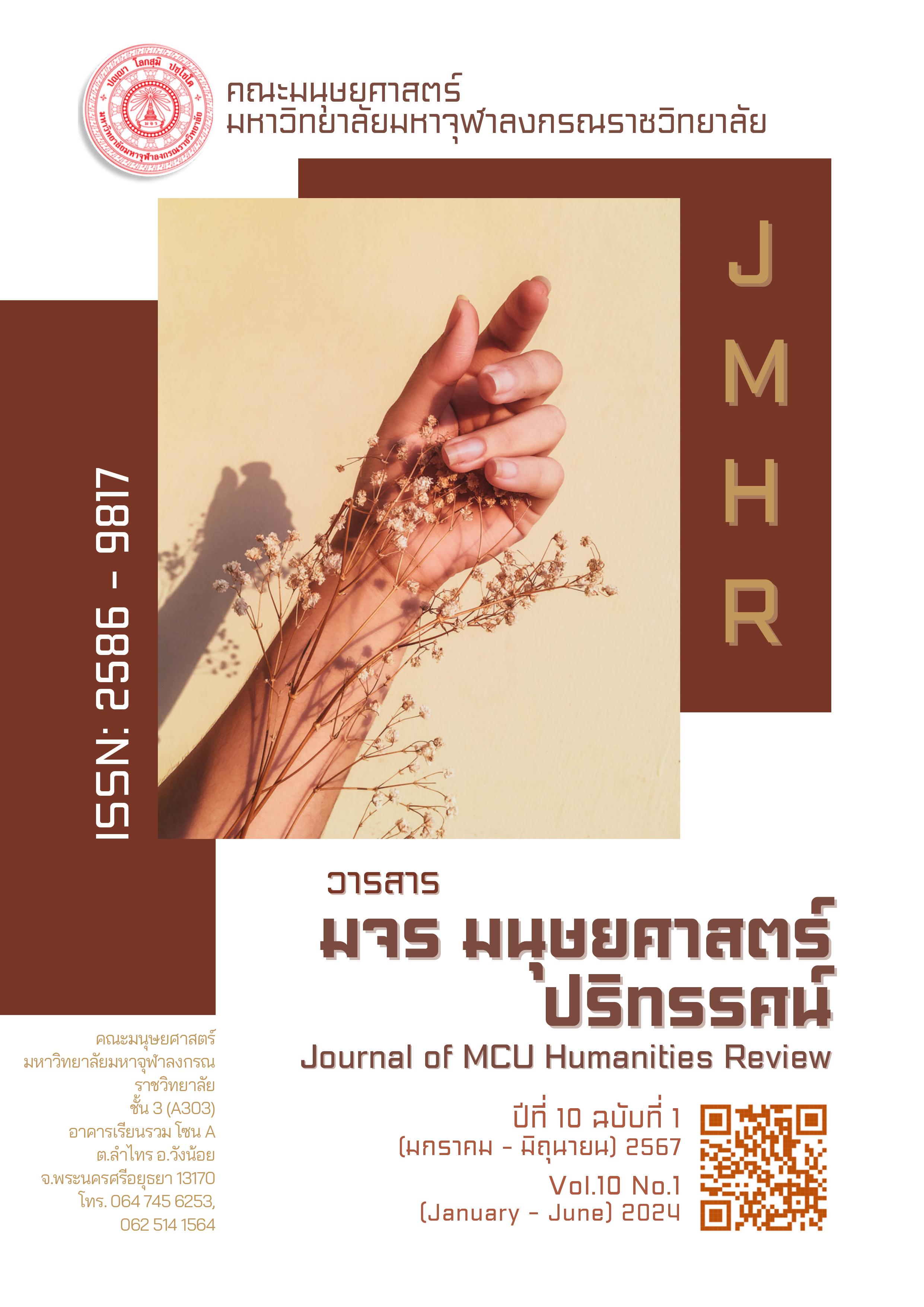การพัฒนาสุขภาวะองค์รวมอย่างมีความสุขตามแนวพุทธจิตวิทยา
คำสำคัญ:
การพัฒนา, สุขภาวะองค์รวม, ความสุข, พุทธจิตวิทยาบทคัดย่อ
สุขภาวะองค์รวมของมนุษย์เป็นเรื่องที่มีความสำคัญในการดำเนินชีวิต ปัญหาสุขภาวะของคนไทยมีความซับซ้อนเนื่องจากประเทศไทยเป็นประเทศที่กำลังพัฒนาและอยู่ในช่วงของการเปลี่ยนผ่านไปสู่ประเทศที่พัฒนา มนุษย์เป็นทรัพยากรที่มีความสำคัญและมีค่าอย่างยิ่ง มีความรู้สึกนึกคิด รวมทั้งมนุษย์มีความปารถนาที่จะมีความสุขในชีวิต และสามารถแก้ไขปัญหาในทางโลกได้ มีความจำเป็นต้องพัฒนาสุขภาวะองค์รวมให้มีความสุขในทุก ๆ ด้าน ที่ประกอบด้วยสุขภาวะทางด้านร่างกาย ด้านจิตใจ ด้านปัญญาและด้านสังคมของมนุษย์ ดังนั้น การพัฒนาสุขภาวะองค์รวมอย่างมีความสุข ตามแนวพุทธจิตวิทยา ให้กับทุกช่วงวัยของมนุษย์จนถึงวัยสูงอายุอันเป็นวัยสุดท้ายของชีวิตเป็นเรื่องที่ควรได้รับการพัฒนาอย่างต่อเนื่อง เป็นปัจจัยที่ช่วยส่งเสริมให้เกิดสุขภาวะองค์รวมอย่างมีความสุข เป็นการพัฒนาสุขภาวะองค์รวมทุกด้านอย่างสมดุล พัฒนาจิตใจและปัญญาโดยการเจริญสติเพื่อเห็นคุณค่าแท้ของปัจจัยต่างๆ และพุทธจิตวิทยาสามารถพัฒนาให้มนุษย์มีสุขภาวะองค์รวมอย่างมีความสุขได้ เป็นการใช้ทั้งหลักพระพุทธศาสนาที่สำคัญและหลักพรหมวิหาร 4 บูรณาการกับหลักจิตวิทยาหรือศาสตร์ตะวันตก ที่คำนึงถึงลำดับขั้นความต้องการของมนุษย์และพฤติกรรมของมนุษย์ รวมทั้ง องค์ประกอบที่สำคัญที่ทำให้เกิดสุขภาวะองค์รวมอย่างมีความสุข เพื่อสร้างความสุขในการดำเนินชีวิตอย่างสมดุล การใช้พุทธจิตวิทยาพัฒนาสุขภาวะองค์รวมอย่างมีความสุข มนุษย์ควรมีการรู้ตนเองและสามารถพัฒนาศักยภาพแห่งตนได้ ทั้งหมดนี้เพื่อให้เข้าถึงความรู้สึก จิตใจของมนุษย์ ที่ทำให้มีพฤติกรรมที่แสดงออกถึงการมีความสุข เพื่อให้มนุษย์สามารถนำไปปรับใช้เป็นแนวทางในการพัฒนาสุขภาวะองค์รวมและสร้างความสุขในการดำเนินชีวิตให้กับตนเองและผู้คนรอบข้างได้ทั้งชีวิตครอบครัว สังคมวัยทำงาน และสังคมผู้สูงอายุ ให้สามารถนำไปพัฒนาตนเองให้เกิดความสุขตามแนวพุทธจิตวิทยาได้
เอกสารอ้างอิง
กรมกิจการผู้สูงอายุ. (2566). สถิติผู้สูงอายุ. สืบค้น 13 มิถุนายน 2566, จาก https://www.dop.go.th/th/know/side/1/1/47
ดวงเนตร ธรรมกุล. (2555). การสร้างสุขภาวะในองค์กร. วารสารวิจัยทางวิทยาศาสตร์สุขภาพ, 6(1), 4.
ณัฐรินทร์ นิธีกีรติชานนท์. (2559). ลักษณะจิตงอกงามตามหลักพุทธจิตวิทยาของผู้ปฏิบัติวิปัสสนากรรมฐาน เขตคลองสาน กรุงเทพมหานคร (พุทธศาสตรดุษฎีบัณฑิต). มหาวิทยาลัยมหาจุฬาลงกรณราชวิทยาลัย. พระนครศรีอยุธยา.
พระเทพวัชรบัณฑิต และ พระมหาสมบูรณ์ วุฑฺฒิกโร. (2564). มองทุกข์ให้สุขได้. ใน การสัมมนามองทุกข์ให้สุขได้, 14 มีนาคม 2564, มหาวิทยาลัยมหาจุฬาลงกรณราชวิทยาลัย. พระนครศรีอยุธยา.
พระพรหมคุณาภรณ์ (ป.อ.ปยุตฺโต). (2550). สุขภาวะองค์รวมแนวพุทธ (พิมพ์ครั้งที่ 11). กรุงเทพฯ : บริษัทสหธรรมิก จำกัด.
“______”. (2557). สุขภาวะองค์รวมแนวพุทธ (พิมพ์ครั้งที่ 35). นครปฐม: วัดญาณเวศกวัน.
พระอนันตชัย อภินนโท (ขันโพธิ์น้อย). (2563). รูปแบบการพัฒนาวัดสัปปายะสร้างสุขเชิงองค์รวมด้วยวิถี 5ส ตามแนวพุทธจิตวิทยา (พุทธศาสตรดุษฎีบัณฑิต). มหาวิทยาลัยมหาจุฬาลงกรณราชวิทยาลัย. พระนครศรีอยุธยา.
ว.วชิรเมธี. (2556). ความสุขในกำมือ. นนทบุรี: สำนักพิมพ์ปราณ.
สมเด็จพระพุทธโฆษาจารย์ (ป.อ.ปยุตฺโต). (2563). พุทธธรรม (พิมพ์ครั้งที่54). กรุงเทพฯ : สำนักพิมพ์ผลิธัมม์.
สุวัฒน์ ธนกรนุวัฒน์. (2562). ผลของการฝึกสติและคิดบวกที่มีต่อสุขภาวะเชิงอัตวิสัยของบุคลากรในโรงพยาบาลชุมชน (พุทธศาสตรดุษฎีบัณฑิต). มหาวิทยาลัยมหาจุฬาลงกรณราชวิทยาลัย. พระนครศรีอยุธยา.
Bradburn, N. M. (1969). The Structure of Psychological Well-Being. Retrieved May 27, 2023, from Source:cirp.org/(S(351jmbntvnsjt1aadkposzje))/reference/ReferencesPapers.aspx?.
Katie Witkiewitz, Alan G. Marlatt and Denise Walker. (2005). Mindfulness-Based Relapse Prevention for Alcohol and Substance Use Disorders. Journal of Cognitive Psychotherapy, 19(3), 211-228.
Kirk Warren Brown and Richard M. Ryan. (2003). The Benefits of Being Present: Mindfulness and Its Role in Psychological Well-being. Journal of personally and social psychology, 84(4), 822-848.
Raymond J. Wlodkowski, (1993). Enhancing Adult Motivation to Learn. Jossey-bass publishers. California.
ดาวน์โหลด
เผยแพร่แล้ว
รูปแบบการอ้างอิง
ฉบับ
ประเภทบทความ
หมวดหมู่
สัญญาอนุญาต
ลิขสิทธิ์ (c) 2024 วารสาร มจร มนุษยศาสตร์ปริทรรศน์

อนุญาตภายใต้เงื่อนไข Creative Commons Attribution-NonCommercial-NoDerivatives 4.0 International License.






